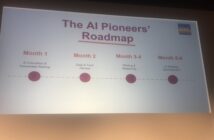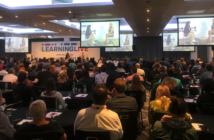This article first appeared on the LCP website.
The old style of leadership is on the way out. Heroic leaders, where it is all about the leader as an individual and how they want to lead teams and organisations from the front, are no longer relevant in today’s global, diverse and fast-moving world. Instead, leadership today is seen as a more dynamic, interactive and collaborative process. Leaders need to manage, collaborate and engage within specific contexts and they need the right skills to do that.
This is what organisations and employees want and need, according to the Learning Consultancy Partnership’s round up of all the latest leadership research and trends from organisations such as Cranfield School of Management and the Center for Creative Leadership.
Why is this change taking place? Because organisations, teams and workplaces are changing.
Current and future teams are much more geographically and culturally diverse and multigenerational. According to the UK Commission for Employment and Skills, by 2030 the UK workforce will be even more multigenerational, with four generations working together. It predicts that the number of economically active people over 65 will increase by a third in the next decade.
Likewise, there will be a greater number of millennials in the workplace. By 2025, they could make up 75% of the global workforce.
So, the workforce is getting younger and older at the same time, which could make the workforce as a whole more complex to lead.
However, a US study found that although there are differences between the different generations – such as comfort with technology – there are many similarities about what they want from their leaders. All the generations surveyed wanted leaders who were collaborative, inclusive, team-orientated, enthusiastic, generous and compliant. They were not keen on leaders who were hierarchical, self-reliant and autonomous.
But do we have these leaders? It would appear not – many organisations are still stuck in the old models of leadership. This is hindering growth and performance, according to the report ‘Bersin & Associates Talent Trends: A Year of Guarded Optimism’. This report found that about 50% of organisations thought their mid-level managers were highly capable and just over 30% of their first line managers. It also states that three quarters of all leadership teams surveyed failed to achieve business goals and that nearly 60% of global leaders considered a lack of leadership to be the main cause of their company’s inability to respond effectively to change.
What constitutes a high performance leader? Not position and status, but a leader’s degree of influence, ability and willingness to collaborate with colleagues across different silos, locations and cultures. Another report, ‘Next Practices in Global-Minded Organisations’, by the Institute for Corporate Productivity, found these skills were critical, as are international experience, the ability to deal with ambiguity and communication and strategy skills.
Being able to deal with ambiguity is a key attribute. Research shows that the leaders of today and tomorrow need the ability to deal with ambiguity and respond quickly and effectively to increasingly complex situations.
As the working environment is changing at an unprecedented rate and on a global level, leaders need to be able to constantly evolve and help their teams evolve. Accenture’s Institute for High Performance interviewed 50 C-suite individuals across five continents. They found that top leaders and leadership teams need a very different set of skills and attitudes to deal with today’s workplace and ambiguities. It found that many organisations use ‘leadership ensembles’, teams of people with distinct expertise to react rapidly to change. This is a marked move away from the heroic leadership approach, where one person holds all the answers and makes all the decisions. Accenture identified four types of ensembles:
- Kitchen cabinets – an inner circle of trusted advisors, usually chaired by the CEO
- Tiger teams – experts and divergent thinkers tasked with an explicit goal
- Advocates – a team of ‘rival’ senior executives and experts, brought together to review a situation and generate debate
- Operators – a team responsible for a specific function, process or location
To help leaders operate effectively in this new environment, much of the research recommends a move away from one-off leadership training events based on concepts and competency frameworks. Instead, there needs to be a greater focus on the emotional intelligence of leaders and developing their understanding of how to make good decisions and the impact they have on those around them.
- To download your free copy of Leadership Development – a round-up of latest research and trends, click here.




